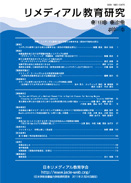Volume 7, Issue 2
Displaying 1-18 of 18 articles from this issue
- |<
- <
- 1
- >
- >|
Special Issue: E-learning in English Education: Past, Present and Future
[Review]
-
2012Volume 7Issue 2 Pages 187-188
Published: September 30, 2012
Released on J-STAGE: June 01, 2017
Download PDF (310K)
[Interpretation]
-
2012Volume 7Issue 2 Pages 189-195
Published: September 30, 2012
Released on J-STAGE: June 01, 2017
Download PDF (7507K) -
2012Volume 7Issue 2 Pages 196-204
Published: September 30, 2012
Released on J-STAGE: June 01, 2017
Download PDF (1209K)
[Research Paper]
-
2012Volume 7Issue 2 Pages 205-215
Published: September 30, 2012
Released on J-STAGE: June 01, 2017
Download PDF (1358K) -
2012Volume 7Issue 2 Pages 216-225
Published: September 30, 2012
Released on J-STAGE: June 01, 2017
Download PDF (12837K)
[Research Note]
-
2012Volume 7Issue 2 Pages 226-237
Published: September 30, 2012
Released on J-STAGE: June 01, 2017
Download PDF (23097K)
- - -
[Research Note]
-
2012Volume 7Issue 2 Pages 238-244
Published: September 30, 2012
Released on J-STAGE: June 01, 2017
Download PDF (927K)
[Practical Report]
-
2012Volume 7Issue 2 Pages 245-253
Published: September 30, 2012
Released on J-STAGE: June 01, 2017
Download PDF (1042K) -
2012Volume 7Issue 2 Pages 254-264
Published: September 30, 2012
Released on J-STAGE: June 01, 2017
Download PDF (11930K) -
2012Volume 7Issue 2 Pages 265-275
Published: September 30, 2012
Released on J-STAGE: June 01, 2017
Download PDF (1337K) -
2012Volume 7Issue 2 Pages 276-285
Published: September 30, 2012
Released on J-STAGE: June 01, 2017
Download PDF (4755K) -
2012Volume 7Issue 2 Pages 286-292
Published: September 30, 2012
Released on J-STAGE: June 01, 2017
Download PDF (890K)
[Material Interpretation]
-
2012Volume 7Issue 2 Pages 293-296
Published: September 30, 2012
Released on J-STAGE: June 01, 2017
Download PDF (514K)
[Correction Report]
-
2012Volume 7Issue 2 Pages 297-
Published: September 30, 2012
Released on J-STAGE: June 01, 2017
Download PDF (35K)
- - -
[Announcement]
-
2012Volume 7Issue 2 Pages 298-302
Published: September 30, 2012
Released on J-STAGE: June 01, 2017
Download PDF (6786K) -
2012Volume 7Issue 2 Pages 303-304
Published: September 30, 2012
Released on J-STAGE: June 01, 2017
Download PDF (2936K) -
2012Volume 7Issue 2 Pages 305-
Published: September 30, 2012
Released on J-STAGE: June 01, 2017
Download PDF (1371K)
[Editor's Postscript]
-
2012Volume 7Issue 2 Pages 308-
Published: September 30, 2012
Released on J-STAGE: June 01, 2017
Download PDF (87K)
- |<
- <
- 1
- >
- >|
